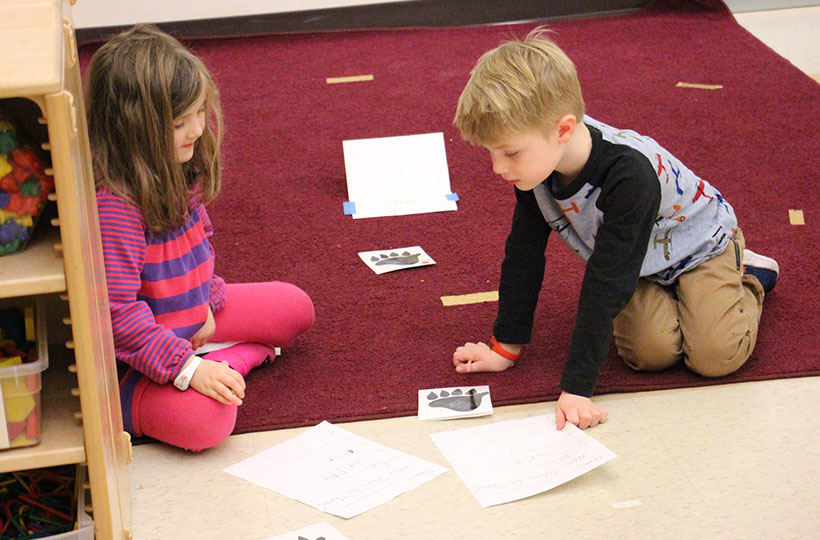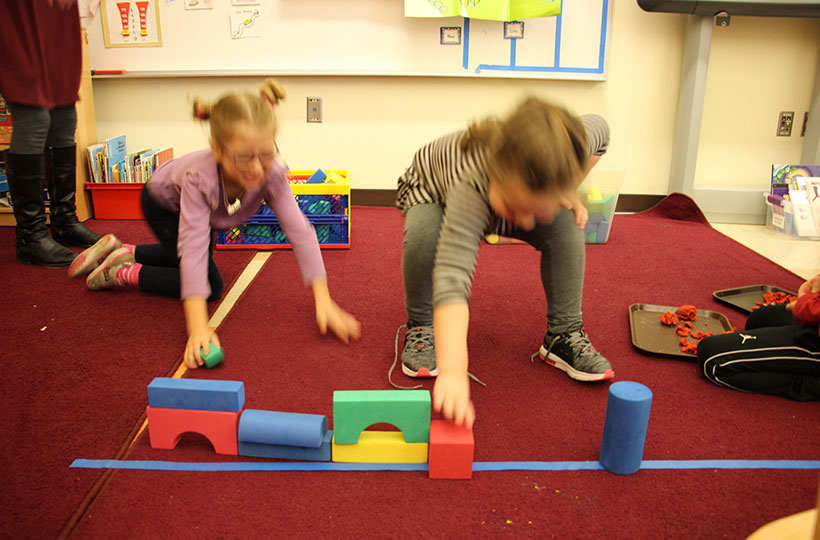Active, imaginative play is intimately linked with early childhood learning. As a parent, how do you know if an educational environment is conducive to development and creativity? Here at The Rashi School, the Boston area’s Reform Jewish School for students in grades K-8, play is integral to teaching our students to internalize concepts and conceptualize solutions. Here’s a case study of how the kindergarten experience at The Rashi School intentionally prioritizes play as the daily work of its youngest students.
“Empathy shapes who I am as an educator,” says kindergarten assistant teacher Rachel Liptz. “Being present with my students and attuned to their needs has been foundational to my pedagogy.”
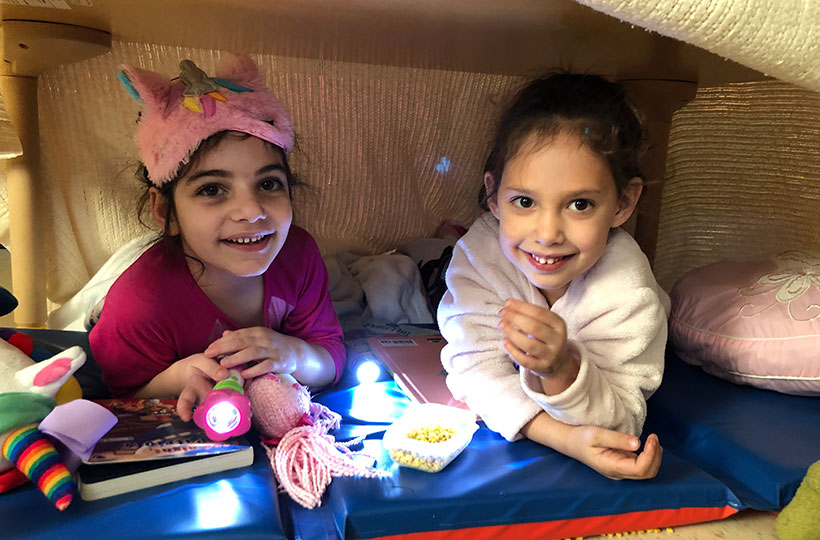
With a background in theater, Mrs. Liptz had always encouraged her drama students to explore a character’s motivations and compare them with their own values and beliefs. Similarly, she challenges her kindergarteners to engage with others by asking questions and comparing perspectives. “When I discovered how empathy is at the root of both the theatrical and developmental approaches, I began to see greater opportunities for active, differentiated learning using my background in theater.” What resulted from this realization is what the students in her classroom know as “dramatic play.”
In dramatic play, Mrs. Liptz transforms the classroom into an active stage. She and her students serve as both audience and storytellers by popping up and down between a space reserved for the class to sit and the rest of the classroom-turned-theater. Desks and tables clear the way by transforming into caverns, or walls. A long roll of paper becomes a raging river; wooden building blocks become the impossibly heavy stones used to erect a pyramid. Students are the players, acting out events declared by their teacher-turned-narrator. In her classroom, Mrs. Liptz brings the study of ancient traditions and texts to life by asking students to connect with the story in real time.
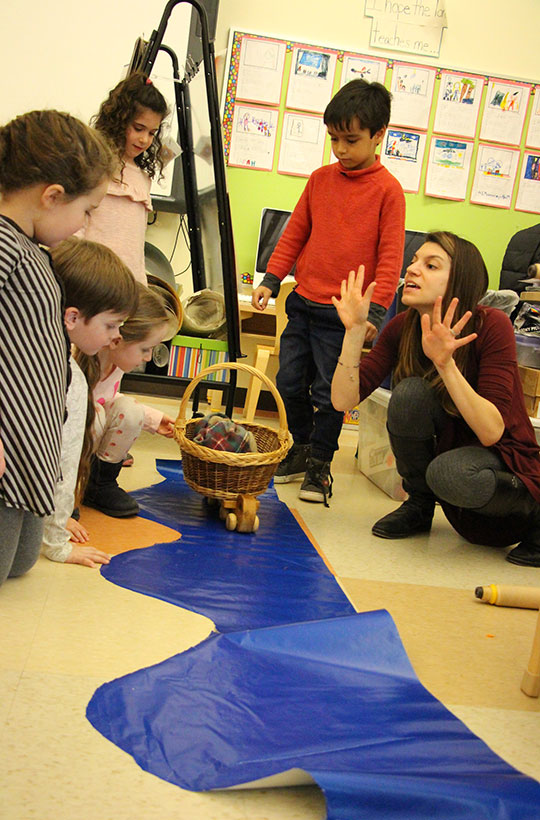
“Infusing dramatic play into an early childhood curriculum can make content accessible and deeply personal for young learners,” Mrs. Liptz explains. “For example, by dramatizing the story of Noah’s Ark, students interpreted a text to conceptualize their character’s physicality and voice. They explored how the cramped conditions of the ark would influence their character’s movements.” Like the characters in the ark, Mrs. Liptz’s students could relate to feeling restricted within a confined space. They recalled long car rides and used these memories to inform their posture and demeanor. They also empathized with Noah and the animals, recognizing how they must have been frightened of the unrelenting storm that battered the ark.
“Many of my students shared that they were fearful of thunder, as Noah’s animals may also have been,” Mrs. Liptz explains. “They employed a combination of their own experience and imagination to react as their character would to the roaring thunder and waves.” Students furthered their study through dramatic play; they explored a character’s physicality, pantomime, and storytelling in small groups.
The benefits of imaginative play are abounding, from providing an outlet for energy in a wiggly, young kindergartener to instilling confidence in a shy one. Participating actively in a lesson has proven to be a very effective method for solidifying concepts in a student’s memory. “In our unit assessment,” Mrs. Liptz reports, “students were able to retell the story in depth and in sequence, recalling supporting details and demonstrating personal connections to the content.” Dramatic play not only encourages understanding concepts for students, it instills confidence in introverted children. “I often find that students who are reluctant to engage in group discussions discover their own voice when adopting that of a character,” Mrs. Liptz says. “Harnessing this in my classroom, I have helped such students practice public speaking and build their self-confidence in a safe, supportive, learner-centric environment.”
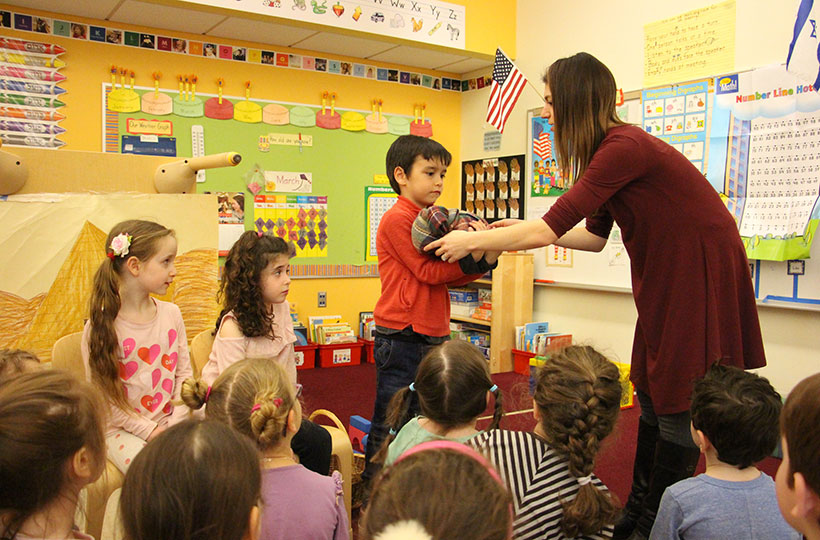
At The Rashi School, we understand that motion and interaction are powerful tools to drive the development of cognitive skills that are key to success in school and in life: attention, perception, memory, language, learning, and higher reasoning. As a result, our students graduate as capable, confident, self-aware learners who take on leadership roles in both educational settings and social justice opportunities in their communities. They go on to thrive in public and independent high schools, universities, and beyond and make a substantial impact as change makers in the world.


